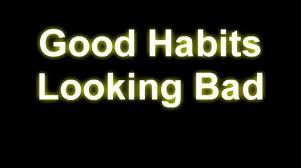Hello!
Habits –good ones at least, especially those that help you to help others, are a good thing, right? So what could possibly be dangerous about a good habit?
Habits that are good are generally considered good because they add value to (your) life. I think we all could agree to that. The question then is this: do your good habits bring the highest and best value to (your) life? ‘Your’ is in parenthesis because bringing value to your life is a first step towards bringing value to life in general; helping yourself is ultimately about helping others.
So are they? Are your good habits bringing the best value they can bring to your life? Think about a couple of what you consider your good habits – are they doing their absolute best to bring value to your life.
If not, perhaps they have fallen prey to these 3 sneaky dangers:
1) Routine – When behavior becomes habitual, often we loose our sense of excitement and the value we place on the benefits of that behavior can be taken for granted. When habits become routine, we begin to go on automatic, taking our self out of the equation in a very real sense: automatic can become ‘without conscious thought’ very quickly.
When this happens, the actual reason we are doing what we do gets lost. A great example is saying a prayer before meals ( or at any other time we deem necessary). I have had to make an extra effort to remain conscious, present and grateful at prayer time before meals (especially if ‘hungry’ is high) because I have felt the flippancy with which I and others can pray.
When a habit becomes perfunctory behavior, be aware of the slippery slope that follows.
2) Doing vs Being – Good habits can give us the false sense of living a “good life.” Because we are doing the right things it does not always mean we are being the right things. A person with a high degree of self-discipline can train themselves to do what they put their mind to do but they may not necessarily walk the talk – internally, spiritually – of those “right things.”
Doing good things can mislead us into thinking that doing is being, when it is not.
3) Good stops great – A very wise man, Dr. Therman Evans said once “good is the enemy of great.” What he meant was this: doing things at a level of good stops us from getting to great. When we accept ‘good enough’ habits and behaviors we stop striving for excellent ones. Excellence takes a back seat to good.
So how can your good habits elevate to excellent habits? And what would that mean to your life? ‘Good’ might mean “for the most part, I have a habit of organizing my desk at the end of each day” which probably translates to having a messy desk once or twice per week..
But think of how much more you can accomplish – creatively and productively – if you had an excellent habit of organizing your desk daily; This would mean that with very few if any, exceptions per week, your desk is clear and ready to get more high level work done each morning. Don’t let your good habits rob you of your greatness!
These dangers and their consequences can easily sneak up on you so be aware and be vigilant about remaining present and connected to all you do, habitually or not.
Review your present habits through the prism of these three sneaky dangers and make adjustments where necessary.
Having excellent habits that help us to add the most value to our life and, to actually be what we are doing is the highest goal.
Wishing you an abundance of success, love and joy,
♥~
